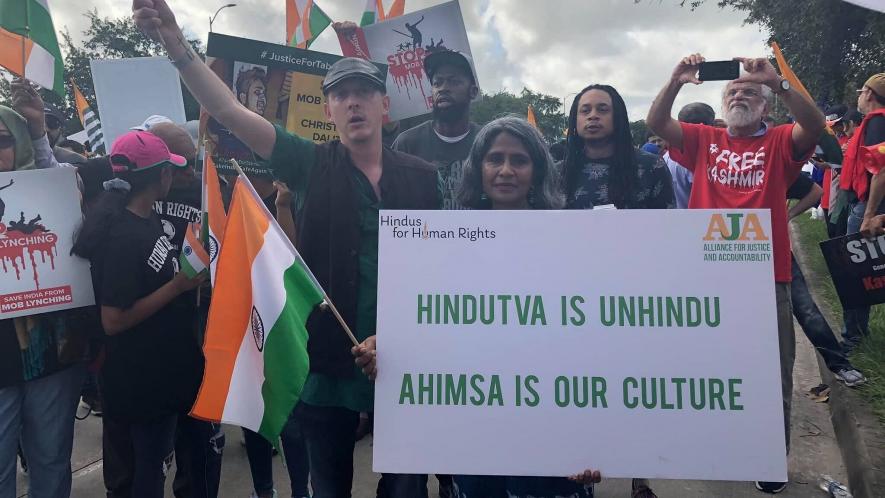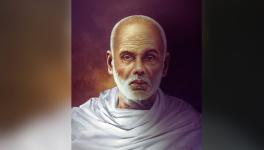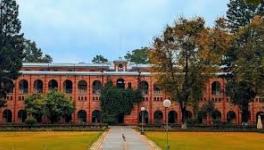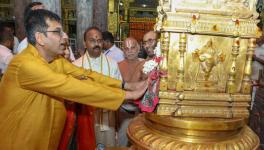US-based Hindu Group Backs Anti-Hindutva Conference

Image Courtesy: Hindus for Human Rights
US-based advocacy group Hindus for Human Rights (HfHR) has opposed the mischaracterisation of the international conference ‘Dismantling Global Hindutva: Multidisciplinary Perspectives’—held between September 10 and 12 and supported by more than 50 global universities—and the threats issued to its organisers, scholars and the participants by various Hindutva groups.
In a letter addressed to the US department of education’s office for civil rights on October 8, the HfHR opposed the sustained campaign of misrepresenting and discrediting the conference and the Hindu American Foundation’s (HAF) complaint against the University of Pennsylvania for allegedly violating Title VI of the Civil Rights Act, 1964.
The HAF had asked the office of civil rights to investigate whether the University of Pennsylvania, one of the co-sponsors of the conference, and its department of South Asia Studies, South Asia Center, “created a hostile environment for students and faculty of Indian and Hindu descent, and whether the same entities and individuals misused any federal funds”.
The HfHR, which advocates pluralism, civil and human rights in South Asia and North America, and provides a Hindu voice of resistance to caste, Hindu nationalism, racism, bigotry and oppression, wrote that the “latest Title VI complaint represents a continuation of this attempt to thwart academic freedom”.
In her letter, HfHR executive director Sunita Viswanath
asked acting assistant secretary for civil rights Suzanne Goldberg and deputy assistant secretary for enforcement Randolph Wills to be “aware that many progressive Hindu and Indian Americans join us in disagreeing with those who have expressed discontent with the conference”.
Mentioning how the conference’s panel on ‘Hinduism and Hindutva’ “provided space for a variety of different voices”, Viswanath wrote: “In this panel, as well as others, there were highly nuanced discussions between those like us who believe in an inclusive vision of what it means to be Hindu, and those who are legitimately more concerned about the endemic nature of caste within Hindu traditions. Such debates and differences are the very essence of an academic inquiry.”
Therefore, the Title VI complaint “misrepresents this rich discussion by cherry-picking statements and taking them out of context”, Viswanath further wrote, adding: “Most importantly, it is simply false that this was a one-sided conference intended to marginalise or stigmatise Hindus.”
Mentioning how the conference provided a platform to practising Hindus, she wrote that the group’s “voice as an organisation committed to an inclusive vision of Hindu identity was certainly included as were the voices of other practising Hindus, including a Hindu priest and scholars of Hinduism”.
However, the letter expressed sadness at how a “significant section of the Hindu-American community, which has greatly benefited from America’s Civil Rights movement, seems to also support Hindu majoritarianism in India—a troubling contradiction of values that we have been speaking out against”. According to her, a 2020 survey conducted by the Carnegie Endowment for International Peace found that 53% of Indian-Americans agree that Hindu majoritarianism is a threat to India and only 40% of Indian Hindu-Americans shared the same view.
“Hindutva-aligned groups are opposed to any critical inquiry of Hindutva and have long opposed the conference, labelling it as “anti-India” and “anti-Hindu”. Such a characterisation clearly betrays a deliberate conflation of Hindutva ideology with Hinduism perhaps to co-opt the community into falsely believing that the conference is directed against Hinduism. However, such groups cannot claim to speak for all Hindus,” the letter states.
The group, which is “quite sensitive to the bias” faced by Hindus and Muslims in the US, wrote: “As a community largely comprising recent immigrants, there is no doubt that Hindus often experience discrimination similar to the experiences of many other immigrant communities in our history. However, we do not believe that nuanced inquiries about Hindutva ideology, such as this conference, promote discrimination against Hindus or threaten the safety of Hindu students.”
Viswanath wrote that the conference organisers and scholars and the participants faced the most virulent threats. “These threats, which nearly shut down the conference, have been well documented in the media now. Nine hundred academics worldwide signed a statement condemning threats to the conference as an attack on academic freedom in the US.”
The conference aimed to explore the consolidation of Hindu supremacist ideology in India and elsewhere. “The foundational principle of the Hindutva ideology (also frequently referred to as Hindu supremacy, Hindu nationalism, etc.) is the establishment of a pure Hindu State (Hindu Rashtra) in India. This would inevitably redefine over 200 million Muslim and Christian citizens of India as the ‘other,’ who do not legitimately belong and must therefore either accept second-class citizenship or be displaced from their homeland.”
The letter stated that “extensive scholarship has shown that the Hindutva ideology is akin to fascism with its founders explicitly referencing German fascism as an inspiration. The ascendance to political power of groups associated with Hindutva has led to unprecedented violence against India’s minorities in recent years”.
Beef ban and the resulting lynching of Muslims and Dalits, restrictions on religious conversions and “rising attacks against Christians, laws targeting interfaith couples, the imprisonment of activists without due process under modified anti-terrorism laws, punitive actions against press and academic freedom, etc. have today become defining features of the world’s largest democracy,” the HfHR further wrote.
Get the latest reports & analysis with people's perspective on Protests, movements & deep analytical videos, discussions of the current affairs in your Telegram app. Subscribe to NewsClick's Telegram channel & get Real-Time updates on stories, as they get published on our website.
























